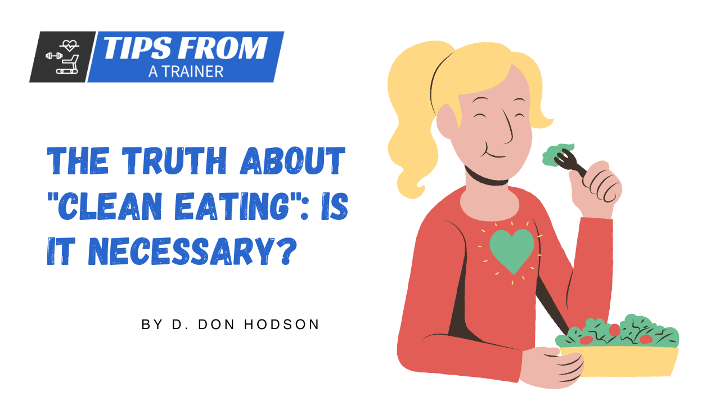Introduction
What is Clean Eating?
Clean eating, a dietary philosophy that has gained substantial attention in recent years, centers around the consumption of unprocessed, whole foods. This approach encourages individuals to prioritize foods that are as close to their natural state as possible, avoiding artificial additives, preservatives, and excessive processing. Clean eating places a strong emphasis on making conscious and mindful choices about the foods we consume.
The Popularity of Clean Eating
The surge in the popularity of clean eating can be attributed to a growing interest in health and wellness, coupled with a desire for a more natural and sustainable approach to nutrition. As people become increasingly aware of the potential health implications of highly processed and sugary foods, the allure of clean eating as a means to optimize health and well-being has grown significantly.
Purpose of the Article
The primary objective of this article is to provide a comprehensive examination of clean eating, shedding light on its underlying principles, potential benefits, as well as addressing any controversies and misconceptions associated with this dietary approach. By offering practical insights and evidence-based information, this article aims to empower readers to make informed decisions about incorporating clean eating into their lifestyles.
Table of Contents
Introduction
What is Clean Eating?
The Popularity of Clean Eating
Purpose of the Article
The Principles of Clean Eating
Definition and Core Principles
Emphasis on Whole, Unprocessed Foods
Avoidance of Added Sugar and Artificial Ingredients
Benefits of Clean Eating
Improved Nutrient Intake
Weight Management and Metabolism
Potential Mental and Emotional Benefits
Criticisms and Controversies Surrounding Clean Eating
Restrictive Nature and Orthorexia Concerns
Lack of Scientific Consensus
Socioeconomic Implications and Accessibility
The Role of Clean Eating in Specific Diets
Clean Eating and Mediterranean Diet
Clean Eating and Plant-Based/Vegan Diets
Clean Eating in Fitness and Bodybuilding
Practical Tips for Incorporating Clean Eating
Meal Planning and Preparation
Reading Labels and Making Informed Choices
Balancing Clean Eating with Indulgences
Myths and Misconceptions about Clean Eating
Misunderstanding of "Clean" and "Dirty" Foods
Equating Clean Eating with Weight Loss
Clean Eating as a Cure-All Solution
Conclusion
Summary of Key Points
Personalized Approach to Clean Eating

The Principles of Clean Eating
Definition and Core Principles
At its core, clean eating promotes the consumption of foods that are minimally processed, free from artificial additives, and as close to their natural state as possible. This dietary approach encourages individuals to focus on whole foods, such as fruits, vegetables, whole grains, lean proteins, and healthy fats, while limiting the intake of heavily processed and refined products. Clean eating places a strong emphasis on the quality and purity of the foods we consume.
Emphasis on Whole, Unprocessed Foods
One of the fundamental tenets of clean eating is the preference for whole, unprocessed foods. These foods retain their natural nutrient content and are free from added sugars, synthetic additives, and unhealthy trans fats. By consuming foods in their natural state, individuals can maximize their intake of essential vitamins, minerals, antioxidants, and dietary fiber, which play crucial roles in supporting overall health and preventing chronic diseases.
Avoidance of Added Sugar and Artificial Ingredients
Clean eating discourages the consumption of added sugars, high-fructose corn syrup, and artificial sweeteners. These additives have been linked to various health issues, including obesity, type 2 diabetes, and cardiovascular diseases. By reducing the intake of these substances, clean eating aims to promote stable blood sugar levels, support weight management, and reduce the risk of metabolic disturbances.
Benefits of Clean Eating
Improved Nutrient Intake
Clean eating places a strong emphasis on consuming nutrient-dense whole foods, which are rich in essential vitamins, minerals, antioxidants, and dietary fiber. By opting for fresh fruits, vegetables, whole grains, lean proteins, and healthy fats, individuals can optimize their nutrient intake. This enhanced nutrient profile contributes to overall health and well-being, supporting various bodily functions, including immune system function, tissue repair, and energy production.
Furthermore, the emphasis on whole foods means that individuals are more likely to consume a wide variety of nutrients, promoting dietary diversity and reducing the risk of nutrient deficiencies. This can be particularly important for individuals with specific dietary restrictions, such as vegetarians or vegans, who need to carefully plan their meals to ensure adequate nutrient intake.
Weight Management and Metabolism
Clean eating's focus on whole foods and limited consumption of processed and high-calorie foods can have positive implications for weight management. Whole foods tend to be more satiating due to their higher fiber content, helping individuals feel fuller for longer periods and potentially reducing overall calorie intake.
Additionally, clean eating's avoidance of added sugars and refined carbohydrates can help stabilize blood sugar levels and prevent rapid spikes and crashes in energy. This can contribute to better appetite control and reduced cravings for sugary and unhealthy foods, which can aid in weight management efforts.
Potential Mental and Emotional Benefits
While the direct relationship between clean eating and mental health is complex and requires further research, some proponents of clean eating argue that a diet rich in nutrient-dense foods may have positive effects on mood and cognitive function. Certain nutrients, such as omega-3 fatty acids, B vitamins, and antioxidants, are thought to play a role in brain health and cognitive performance.
Additionally, the act of making mindful and health-conscious food choices may have a positive psychological impact. Engaging in clean eating practices can foster a sense of accomplishment, self-control, and self-care, which may contribute to improved overall well-being.
Criticisms and Controversies Surrounding Clean Eating
Restrictive Nature and Orthorexia Concerns
One of the primary criticisms of clean eating is its potential to become overly restrictive. The strict adherence to specific food rules and the categorization of foods as "clean" or "dirty" can lead to an unhealthy preoccupation with food choices. This obsession, known as orthorexia, may result in anxiety, guilt, and social isolation.
It's important to recognize that not all foods fit neatly into the categories of "clean" or "unclean." Such labeling can foster an unhealthy relationship with food and potentially contribute to disordered eating behaviors. Instead, health professionals encourage a balanced and flexible approach to nutrition that allows for a variety of foods in moderation.
Lack of Scientific Consensus
Clean eating, as a concept, lacks a standardized definition, which has led to a lack of scientific consensus surrounding its principles and benefits. While the general idea of prioritizing whole, unprocessed foods is supported by health experts, the specific guidelines and restrictions associated with clean eating vary widely.
Moreover, claims about the superiority of clean eating over other dietary approaches lack robust scientific evidence. The effectiveness of clean eating for weight loss, disease prevention, and overall health is still a subject of ongoing research. It's important for individuals to critically evaluate claims and rely on evidence-based recommendations when making dietary choices.
Socioeconomic Implications and Accessibility
Clean eating's emphasis on fresh, organic, and minimally processed foods can present challenges for individuals with limited access to such options. The availability and affordability of these foods can vary based on geographic location, socioeconomic status, and other factors.
This socioeconomic disparity can contribute to inequalities in health and nutrition. While clean eating may be a viable option for some, it's important to acknowledge that not everyone has equal access to the resources needed to fully embrace this dietary approach. As a result, promoting a one-size-fits-all approach to clean eating may not be practical or equitable.
The Role of Clean Eating in Specific Diets
Clean Eating and Mediterranean Diet
Clean eating and the Mediterranean diet share a common focus on whole, nutrient-dense foods. The Mediterranean diet, inspired by the traditional eating patterns of countries bordering the Mediterranean Sea, emphasizes the consumption of fruits, vegetables, whole grains, legumes, nuts, seeds, olive oil, and lean proteins. This aligns well with clean eating principles, as both approaches prioritize foods in their natural state while minimizing processed and sugary options.
Clean eating's emphasis on fresh produce and lean proteins resonates with the Mediterranean diet's core components. By combining these two dietary philosophies, individuals can create a well-rounded eating pattern that promotes heart health, provides essential nutrients, and supports overall well-being.
Clean Eating and Plant-Based/Vegan Diets
Clean eating can seamlessly integrate with plant-based and vegan diets, as both prioritize whole, plant-derived foods. Plant-based diets center around fruits, vegetables, legumes, nuts, seeds, and grains, while avoiding or minimizing animal products. Clean eating's emphasis on whole and minimally processed foods aligns with the core principles of plant-based eating.
By incorporating a variety of colorful fruits and vegetables, whole grains, and plant-based proteins, individuals can create nutrient-rich meals that support optimal health. However, it's important for those following a plant-based or vegan clean eating approach to ensure adequate intake of essential nutrients such as vitamin B12, iron, calcium, and omega-3 fatty acids.
Clean Eating in Fitness and Bodybuilding
Clean eating has gained popularity within fitness and bodybuilding communities due to its potential to support muscle development, energy levels, and overall performance. The emphasis on consuming lean proteins, whole grains, and nutrient-dense foods can provide the necessary nutrients for muscle repair and growth.
For individuals engaged in intense physical training, clean eating can help optimize energy levels, enhance recovery, and promote overall well-being. By focusing on nutrient timing and fueling the body with wholesome foods, fitness enthusiasts and bodybuilders can achieve their performance goals while nourishing their bodies.
Practical Tips for Incorporating Clean Eating
Meal Planning and Preparation
Effective meal planning and preparation are essential for successfully incorporating clean eating into daily life. Planning meals in advance allows individuals to make deliberate choices and avoid impulsive, less nutritious options.
Begin by setting aside dedicated time each week to plan your meals and create a shopping list. Focus on incorporating a variety of whole foods, including vegetables, fruits, lean proteins, whole grains, and healthy fats. Batch cooking can save time and ensure that nutritious meals are readily available throughout the week.
Reading Labels and Making Informed Choices
Developing the skill to read and understand food labels is crucial for making informed choices while grocery shopping. When selecting packaged foods, examine the ingredient list to identify additives, preservatives, and artificial ingredients.
Opt for products with short and recognizable ingredient lists, and prioritize items with minimal added sugars and sodium. Keep in mind that some processed foods, even if labeled as "natural" or "healthy," may still contain hidden additives, so critical evaluation of labels is essential.
Balancing Clean Eating with Indulgences
While clean eating encourages the consumption of nutrient-dense foods, it also acknowledges the importance of balance and flexibility. Allowing occasional indulgences can contribute to a sustainable and enjoyable approach to eating.
Instead of completely eliminating all indulgent foods, consider incorporating them mindfully and in moderation. By savoring these treats and enjoying them on special occasions, individuals can avoid feelings of deprivation and maintain a positive relationship with food.
Myths and Misconceptions about Clean Eating
Misunderstanding of "Clean" and "Dirty" Foods
One prevalent myth surrounding clean eating revolves around the categorization of foods into binary labels of "clean" and "dirty." This oversimplification fails to capture the complexity of nutritional value and can lead to misconceptions about the healthfulness of certain foods.
In reality, the concept of clean eating promotes a more nuanced understanding of food choices, focusing on the quality of ingredients, processing methods, and nutrient content. While it encourages the consumption of whole, unprocessed foods, clean eating does not necessarily label other foods as inherently "dirty." It's essential to recognize that balance and variety play crucial roles in a healthy diet.
Equating Clean Eating with Weight Loss
Another common misconception is the belief that clean eating is a guaranteed path to weight loss. While adopting a clean eating lifestyle can contribute to weight management by promoting the consumption of nutrient-dense foods and reducing calorie-dense, processed options, it is not a guaranteed solution.
Weight loss and maintenance involve a combination of factors, including genetics, physical activity, metabolism, and overall energy balance. Clean eating should be seen as a component of a holistic approach to health, rather than a singular method solely focused on shedding pounds.
Clean Eating as a Cure-All Solution
It's important to dispel the notion that clean eating is a cure-all solution for various health issues. While a balanced and nutrient-rich diet is undoubtedly beneficial for overall well-being, it is not a substitute for medical treatments or interventions.
While clean eating may support general health and wellness, it cannot replace medical advice, prescribed medications, or treatments for specific medical conditions. Clean eating should be viewed as a complementary approach to a healthy lifestyle, alongside proper medical care and professional guidance.
Conclusion
Summary of Key Points
In this comprehensive exploration of clean eating, we've unraveled its core principles, benefits, criticisms, and practical applications. Clean eating emphasizes the consumption of whole, unprocessed foods and offers potential benefits such as improved nutrient intake, weight management, and mental well-being.
However, it's crucial to approach clean eating with a balanced perspective, recognizing its limitations, potential drawbacks, and the need for individualized approaches. The dietary landscape is complex, and adopting a rigid mindset can hinder overall well-being.
Personalized Approach to Clean Eating
As individuals, we have unique nutritional needs, preferences, and circumstances. Instead of adhering to a one-size-fits-all approach, it's advisable to tailor clean eating principles to fit our individual goals and lifestyles.
Adopting a personalized approach involves making informed choices, listening to our bodies, and striking a balance between nourishment and enjoyment. Clean eating, when approached in a flexible and sustainable manner, can be a valuable tool for enhancing health and promoting overall well-being.
By embracing the principles of clean eating while remaining open to individual preferences and needs, we can navigate the complexities of modern nutrition and embark on a journey toward optimal health and vitality.

Don Hodson, Certified Personal Trainer
I'm Don, an ACE-certified personal trainer and the founder of Tips From A Trainer. With my passion for fitness and years of experience, I've helped countless individuals transform their physiques!
Having personally overcome weight challenges throughout my life, I understand the struggle. Through consistency, exercise, and a balanced diet, I have managed to stay in shape and I want to share my message with the world!
The fitness industry is fraught with misconceptions and deceptive practices, which is why I am committed to providing you with the truth.
- My Site: www.Don-Hodson.com
- My Company: www.ConnectedAgeMarketing.com

The Truth About "Clean Eating"